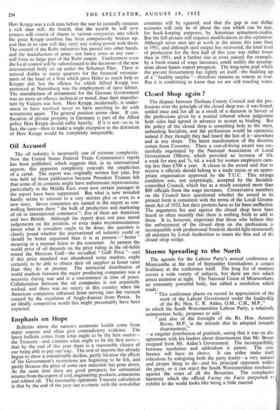Oil Accused
The oil industry is necessarily one of extreme complexity. Now the United States Federal Trade Commission's report has been published, which suggests that, in its international aspects, this apparent complexity conceals the simplicities of a cartel. The report was originally written last year, but was held up from publication because President Truman felt that some of its contents might have unfortunate repercussions, particularly in the Middle East; even now certain passages in the report have been suppressed. But what is now revealed hardly seems to amount to a very sinister plot or even to a new story. Seven companies are named in the report as con- trolling between them " the bulk of production and marketing of oil in international commerce "; five of them are American and two British. Although the report does not pass moral judgements on the position, or even make recommendations about what it considers ought to be done, the question is clearly posed whether the international oil industry could or should be better organised than it is at present—" better " meaning in a manner fairer to the consumer. At present the world price of oil depends on the price ruling in the oil-fields round the Mexican Gulf—the so-called " Gulf Price "—and if this price standard was abandoned some markets ought certainly to be able to obtain their oil supplies at lower rates than they do at present. The territorial distribution of world markets between the major producing companies was a necessity during war and is a convenience in time of peace. Collaboration between the oil companies is not essentially wicked, and there was no outcry in this country when the American companies refrained from moving into the vacuum created by the expulsion of Anglo-Iranian from Persia. In an ideally competitive world this might presumably have been expected.


































 Previous page
Previous page